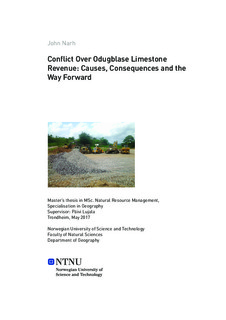Conflict over Odugblase limestone revenue : causes, consequences and the way forward
Master thesis
Permanent lenke
http://hdl.handle.net/11250/2449666Utgivelsesdato
2017Metadata
Vis full innførselSamlinger
- Institutt for geografi [1097]
Sammendrag
This study investigated the conflict between Manya and Yilo traditional councils which has prevented them to have access to their over 1 billion Cedis mineral revenue to advance socioeconomic development of the Krobos. Adopting a qualitative approach, this study used purposive sampling to select 17 research participants for in-depth interviews. The study further adopted inductive content analysis to process and make meaning from the interviews. It was found that narrow-based (rational and incremental) planning, and a discord between Traditional Chieftaincy and modern democratic systems of governance contributed to Manya-Yilo conflict. This study also revealed that lack of clearly defined regulations for natural resource revenue sharing and powerless Municipal Assemblies (weak institutions) contributed to the conflict between Manya and Yilo Traditional Councils (Manya-Yilo conflict). It was also found that deteriorating social relationship between the two Traditional Councils and retarded economic development were the main socio-economic consequences of the Manya-Yilo conflict. Unfortunately, attempts to resolve the Manya-Yilo conflict through arbitration and mediation did not yield the desired results because the opponents were not adequately involved in the conflict resolution process. It seems that adjudication, which is conflict resolution in the court of law, could resolve the Manya-Yilo conflict. This thesis contributes to literature by showing that narrow-based (rational and incremental) planning and the political structure contribute to micro-scale non-violent conflict over mineral revenue sharing in Ghana. It also contributes to literature by conceptualising a framework of the onset of non-violent natural resource conflict. This thesis warns that failing to use broad-based planning for natural resource management is not just planning to fail, it is also a likely recipe for natural resource conflict. As such, there is the need to adopt participatory natural resource management to reduce natural resource conflict in the future.
